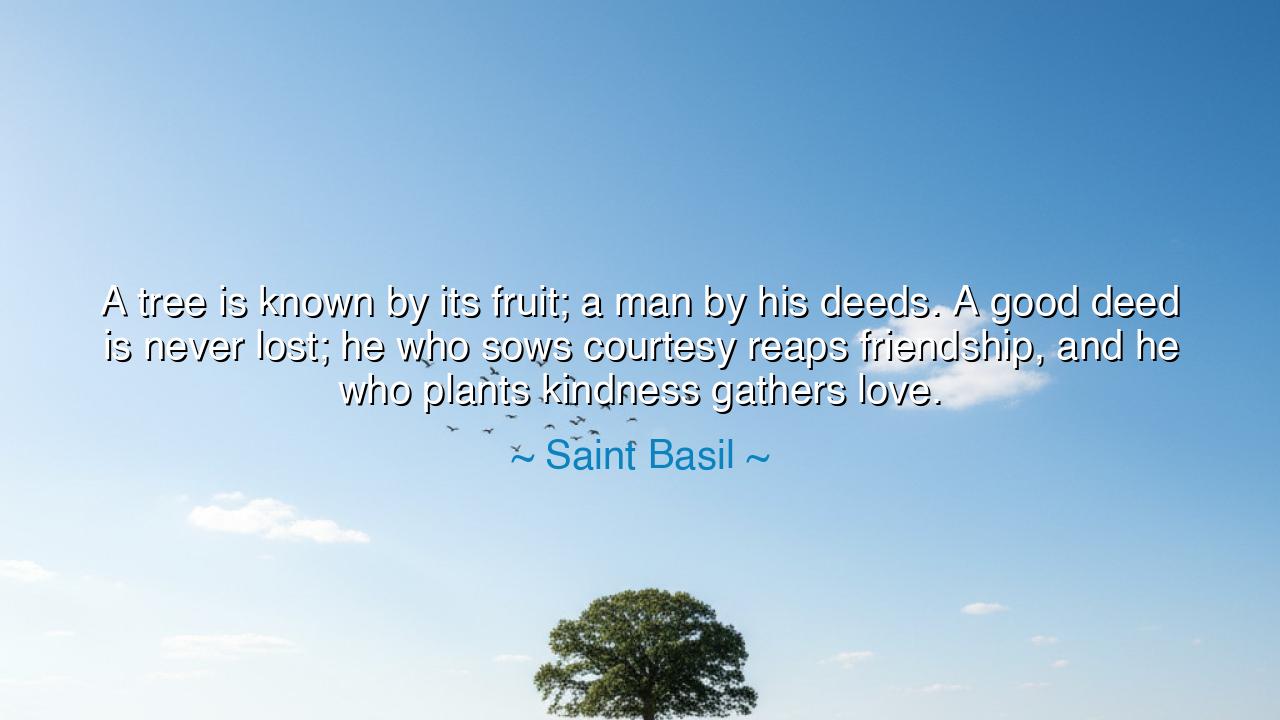
A tree is known by its fruit; a man by his deeds. A good deed is
A tree is known by its fruit; a man by his deeds. A good deed is never lost; he who sows courtesy reaps friendship, and he who plants kindness gathers love.






“A tree is known by its fruit; a man by his deeds. A good deed is never lost; he who sows courtesy reaps friendship, and he who plants kindness gathers love.”
Thus spoke Saint Basil, the great Father of the early Church, whose words flow like pure water from the springs of wisdom. In this saying lies a truth as ancient as creation itself—that the measure of a man is not in his words, nor in his lineage, nor in the wealth he gathers, but in the deeds he performs, the fruits his life bears. Just as an orchard reveals the nature of its trees by the sweetness or bitterness of its harvest, so too the soul reveals its inner character through its actions. The fruit of one’s life cannot be hidden forever; for from the root of virtue springs honor, and from the root of selfishness, decay.
Saint Basil, who lived in the fourth century, spoke these words in an age when faith was tested by persecution and power often cloaked itself in false virtue. He saw clearly that the true proof of goodness lies not in reputation but in action. A man may speak of love, but if his hands do not serve, his words are but empty wind. A tree may boast of leaves, yet if it bears no fruit, it stands useless in the garden of the Lord. Thus, Basil taught that the soul’s worth is revealed through good deeds—those quiet, selfless acts that give life and nourishment to others.
The second part of his saying is a law written upon the very fabric of the universe: “A good deed is never lost.” Like seeds cast upon fertile soil, the smallest acts of goodness take root and multiply. Time and circumstance may hide their growth, but in due season they bear fruit. Consider the story of Florence Nightingale, who entered the blood-soaked hospitals of the Crimean War armed not with sword or shield, but with lamp and mercy. She tended the wounded, comforted the dying, and through her steadfast compassion transformed the very nature of medicine. Her kindness was the seed; the harvest was not only healing, but a new vision of humanity’s duty to care. Her deeds outlived her mortal years—they became the fruit by which her life is forever known.
“He who sows courtesy reaps friendship.” Courtesy, in the ancient sense, is not mere politeness, but the noble art of respect—the recognition of another’s dignity. It is the seed of harmony in the field of human hearts. When a man speaks gently, listens earnestly, and acts with honor toward others, he draws kindred souls to himself. In the courts of kings and in the huts of the poor, friendship has always been born from such seeds. Even a single word of respect can turn a stranger into an ally, and a small act of regard can heal divisions that pride has long sustained.
And “he who plants kindness gathers love.” Kindness is the highest fruit of the human spirit—the flowering of compassion, the reflection of divine grace. To plant kindness is to give without expectation, to act with gentleness even when wronged, to offer warmth where the world is cold. Love is not conquered by force nor demanded by command; it is gathered through the slow and patient labor of kindness. The heart that gives freely will, in time, find itself surrounded by affection, for goodness calls to goodness as the dawn calls to the sun.
Saint Basil’s teaching is both simple and profound: every action is a seed. Every choice we make falls into the soil of life and brings forth a harvest—whether of bitterness or joy. Therefore, let every man be mindful of the fruit he bears. Let him ask not, “What do I receive?” but, “What do I give?” For only the tree that gives shade and fruit is beloved by those who rest beneath it. The barren one, though tall and proud, will one day be cut down and cast aside.
The lesson, then, is this: live so that your deeds speak louder than your words, and sow goodness wherever you walk. Be courteous to all, for every soul carries the image of the divine. Be kind, even when the world seems unworthy of it. And know that though your good deeds may vanish from sight, they do not vanish from being. In time, they return to you in the form of friendship, love, and peace.
Remember, my child: you are the gardener of your own soul. The seeds you plant today will shape the orchard of your tomorrow. If you would be known as a good tree, bear good fruit—fruit that nourishes, shelters, and sweetens the lives of others. For in the end, when the seasons of life draw to a close, it is not the height of the tree that matters, but the sweetness of its fruit.






AAdministratorAdministrator
Welcome, honored guests. Please leave a comment, we will respond soon